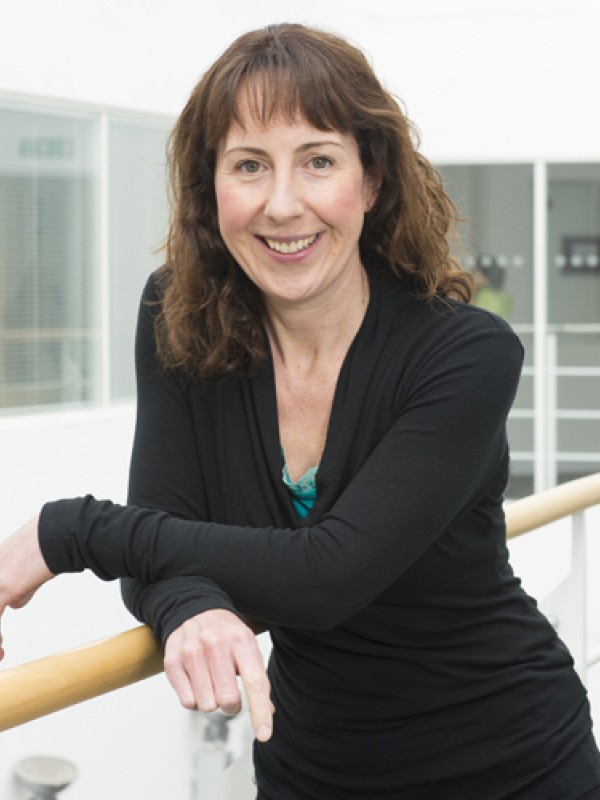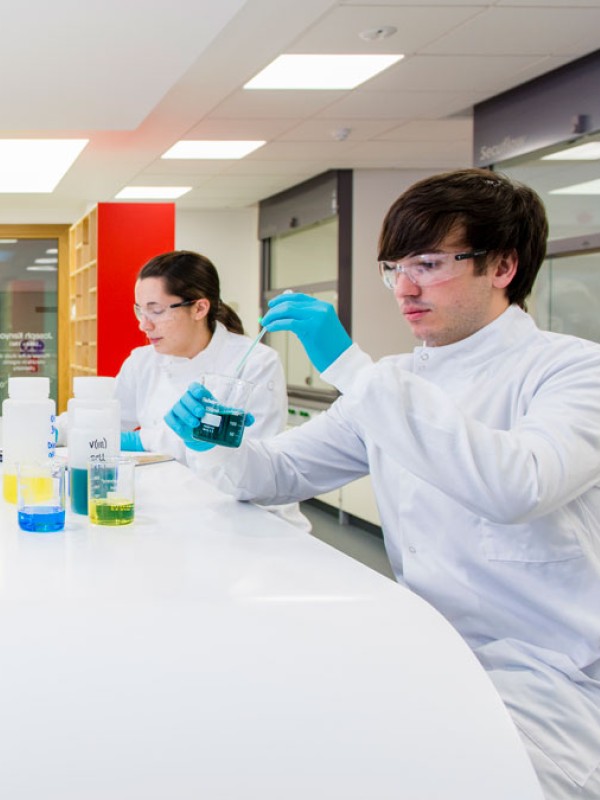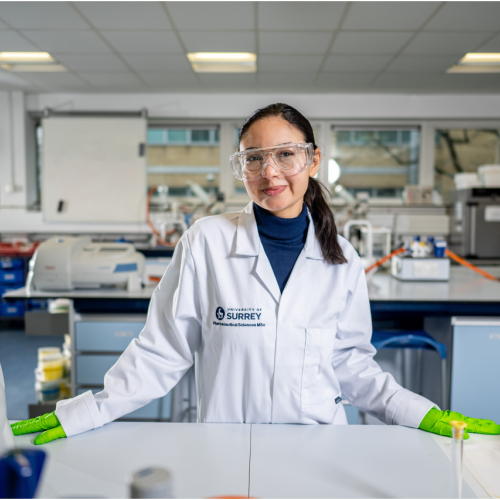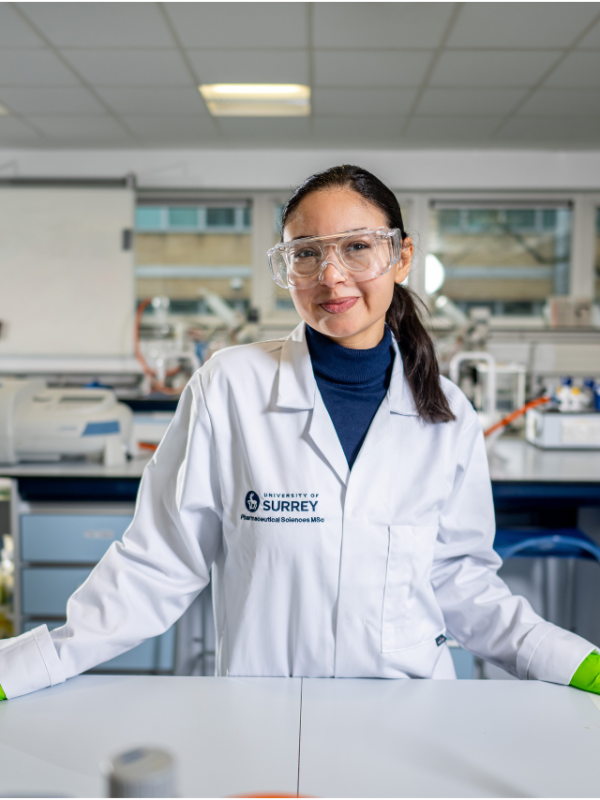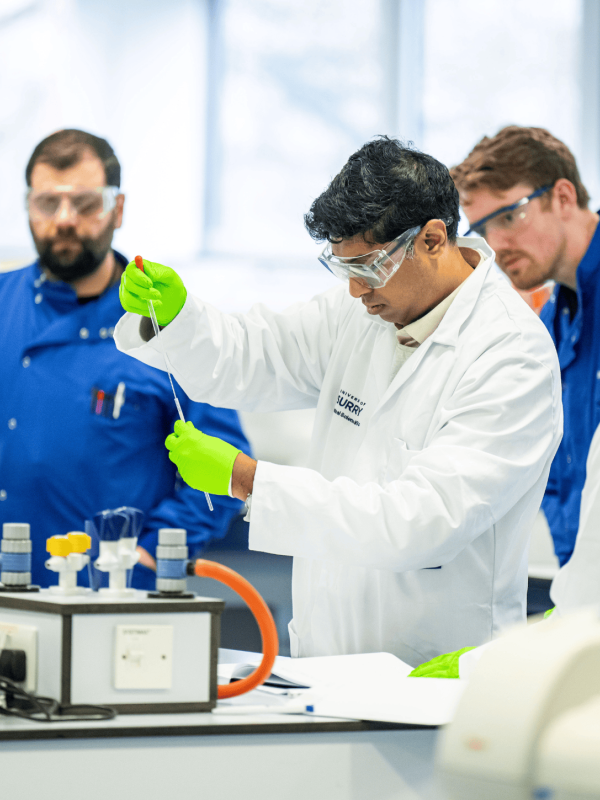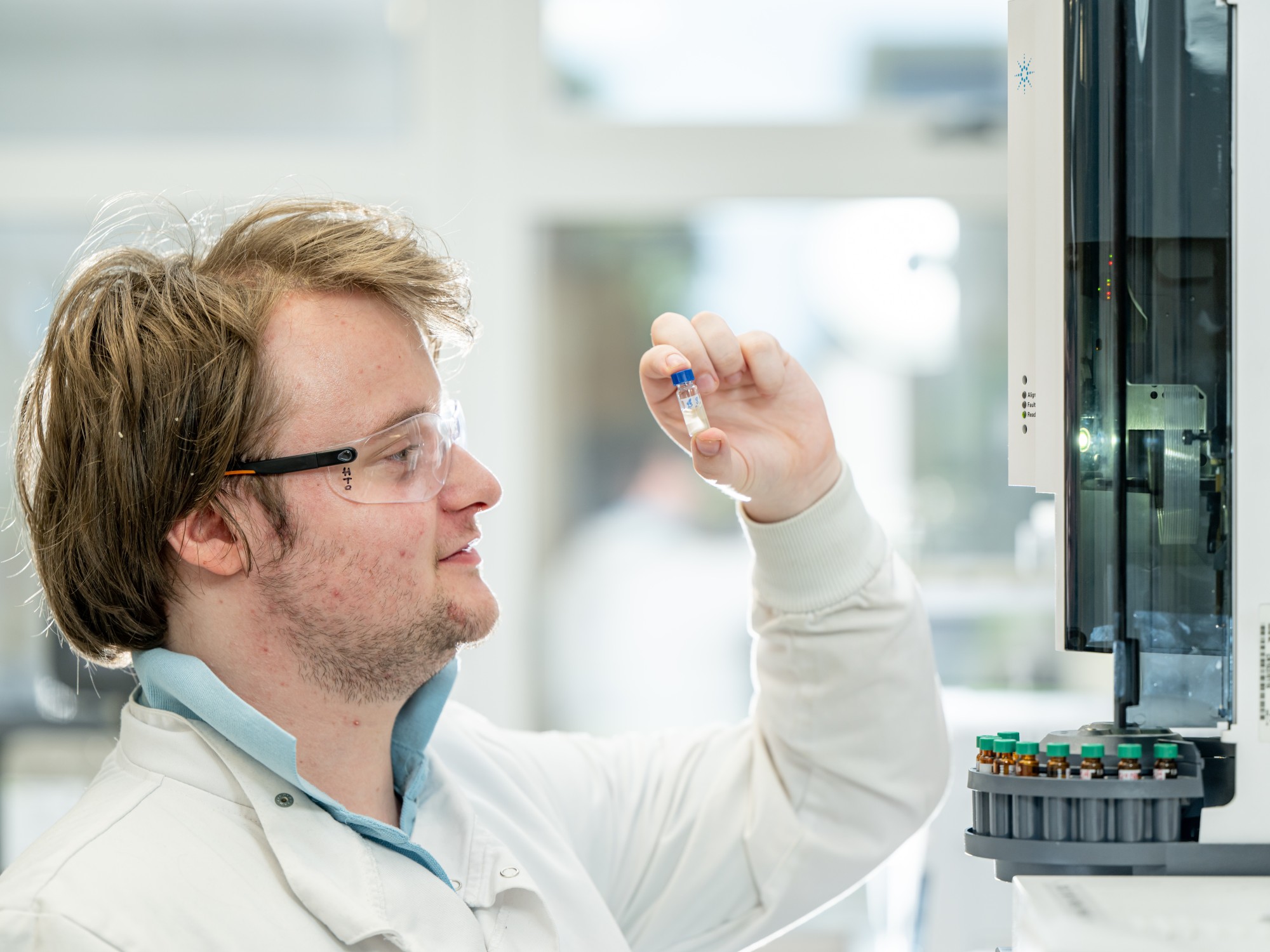
- Analytical Sciences
MSc — 2026 entry Analytical Sciences
Our Analytical Sciences MSc provides a thorough grounding in fundamental theory and advanced techniques. Benefit from hands-on measurement experience with instrumentation, testing, radiochemistry and data analysis, preparing you for a career across multiple industries.
4,138+ people have created a bespoke digital prospectus
Why choose
this course?
This course will give you a thorough understanding of the core principles, processes and applications within analytical chemistry.
- You’ll have unique access to advanced instruments, gaining knowledge and experience that will make you stand out from the crowd.
- The interdisciplinary nature of this course means you’ll learn techniques and applications from chemistry, pharmaceutical sciences and radiochemistry gaining a deeper understanding of the analytical sciences.
- You’ll work on and design your own validation programmes and analytical methods, ensuring they meet key parameters.
- Through problem-based learning, you’ll develop an ability to work in multiple settings and have the independent thinking skills to respond to different challenges.
- Employability is at the heart of this course. You’ll learn from industry experts - hear what matters to them, what businesses are looking for, the challenges facing industry today and get valuable opportunities to network.
What you will study
- Develop comprehensive knowledge of the analytical process, and how it acts as a key underpinning science for manufacturing and Research and Design (R&D), both in the UK and worldwide
- The modules on this course cover the entire analytical process, from separation of complex mixtures, identification, advanced spectroscopic techniques, radioanalysis and manufacture to quality control
- You will complete a laboratory-based research project in our world-class facilities and learn from specialist module content focusing on cutting edge knowledge and industrial standards in the fields of environmental protection, energy, healthcare, pharmaceuticals, food safety, and forensic science
- You will develop the skills to interrogate and integrate diverse sources of scientific literature, to design and develop methods for investigation and analysis.
In depth radiochemistry module
Unique to Surrey, this course offers in depth teaching of radiochemistry taught in collaboration with the National Physical Laboratory (NPL).
The hands-on module in the second semester utilises Surrey’s Radiation Laboratory to help you build your knowledge of handling and taking measurements of radioactive materials, as well as relevant safety considerations.
With several applications in environmental monitoring and in healthcare including cancer imaging, there is a growing need for trained professionals to ensure that its applications are safe and of the highest quality.
Facilities
Throughout your Analytical Sciences MSc, you'll be hands-on in cutting-edge facilities within our School of Chemistry and Chemical Engineering - giving you valuable experience with instruments you'll find in a professional laboratory.
You’ll also have the opportunity to study in our Radiation lab and newly refurbished Pharmaceutical Sciences laboratory and carry out statistical analysis using specialist software in our computer clusters.
ICP-MS
Inductively coupled plasma mass spectrometry (ICP-MS) was developed at Surrey in the early 1980s. The facility on campus has the longest history of academic research in this academic field and is home to a range of specialist equipment.
The structure of our programmes follows clear educational aims that are tailored to each programme. These are all outlined in the programme specifications which include further details such as the learning outcomes:
Teaching and learning
We have a research-led focus to our teaching, ensuring that everything you learn is up-to-date and relevant to employers.
You’ll be taught by lecturers who are active researchers in their respective fields. These may include:
You’ll also learn from external speakers and lecturers, including experts from the National Physical Laboratory and Philosophy of Science Association.
Learning methods
- Group work
- Laboratory work
- Lectures
- Project work
- Seminars
- Research work
- Workshops
General course information
Contact hours
Contact hours can vary across our modules. Full details of the contact hours for each module are available from the University of Surrey's module catalogue. See the modules section for more information.
Timetable
New students will receive their personalised timetable during Welcome Week. In later semesters, at least one week before the start of the semester.
Scheduled teaching can take place on any day of the week (Monday – Friday), with part-time classes normally scheduled for one or two days. Wednesday afternoons tend to be for sports and cultural activities.
View our code of practice for the scheduling of teaching and assessment (PDF) for more information.
Location
This course is based at Stag Hill campus. Stag Hill is the University's main campus and where the majority of our courses are taught.
We offer careers information, advice and guidance to all students whilst studying with us, which is extended to our alumni for three years after leaving the University.
There is demand for qualified analytical chemists in diverse roles across industry and public sectors. With a degree in Analytical Sciences, you could go on to work in environmental protection, analysing shellfish for toxin content, help to monitor the environment for radioactive contamination, or environmental analysis for PFAS contamination.
Analytical chemists are also in demand in sectors including energy, healthcare, pharmaceuticals, food safety, and forensic science.
UK qualifications
A minimum of a 2:2 UK honours degree or a recognised equivalent international qualification in chemistry or a relevant subject area.
In exceptional circumstances, we may be able to take relevant work experience into consideration if applicants don't meet these requirements.
English language requirements
IELTS Academic: 6.5 overall with 6.0 in writing and 5.5 in each other element.
These are the English language qualifications and levels that we can accept.
If you do not currently meet the level required for your programme, we offer intensive pre-sessional English language courses, designed to take you to the level of English ability and skill required for your studies here.
Recognition of prior learning
We recognise that many students enter their course with valuable knowledge and skills developed through a range of ways.
If this applies to you, the recognition of prior learning process may mean you can join a course without the formal entry requirements, or at a point appropriate to your previous learning and experience.
There are restrictions for some courses and fees may be payable for certain claims. Please contact the Admissions team with any queries.
Scholarships and bursaries
Discover what scholarships and bursaries are available to support your studies.
Fees
Explore UKCISA’s website for more information if you are unsure whether you are a UK or overseas student. View the list of fees for all postgraduate courses.
September 2026 - Full-time - 1 year
- UK
- £11,300
- Overseas
- £18,600
September 2026 - Full-time (with placement) - 2 years
- UK
- £12,500
- Overseas
- £19,800
September 2026 - Part-time - 2 years
- UK
- £5,700
- Overseas
- £9,300
- The fee for the placement pathway will be charged in Year 1 of the programme and a fee of £1,850 is payable in Year 2 of the programme
- Once enrolled, students who decide to change from the two-year with placement course to the one-year full time course will not be entitled to a refund of the difference in course fees between the one-year full time course and the first year of the two-year with placement course
- These fees apply to the academic year 2026-27 only. Fees are reviewed annually, and tuition fees may increase for courses running over more than one year.
Payment schedule
- Students with Tuition Fee Loan: the Student Loans Company pay fees in line with their schedule (students on an unstructured self-paced part-time course are not eligible for a Tuition Fee Loan).
- Students without a Tuition Fee Loan: pay their fees either in full at the beginning of the programme or in two instalments as follows:
- 50% payable 10 days after the invoice date (expected to be October/November of each academic year)
- 50% in January of the same academic year.
- Students on part-time programmes where fees are paid on a modular basis: cannot pay fees by instalment.
- Sponsored students: must provide us with valid sponsorship information that covers the period of study.
The exact date(s) will be on invoices.
Additional costs
Field trip - £40: In Semester 2, we will visit the National Physical Laboratory in London where students will observe their outstanding facilities up close. This visit complements most modules on the course, but is particularly relevant to the 'Radio Analysis' module.
Funding
You may be able to borrow money to help pay your tuition fees and support you with your living costs. Find out more about postgraduate student finance.
Apply online
To apply online first select the course you'd like to apply for then log in.
Select your course
Choose the course option you wish to apply for.
Sign in
Create an account and sign into our application portal.
Please note that we may have to close applications before the stated deadline if we receive a high volume of suitable applications. We advise you to submit your application as soon as it is ready.
ApplyPlease note that we may have to close applications before the stated deadline if we receive a high volume of suitable applications. We advise you to submit your application as soon as it is ready.
ApplyPlease note that we may have to close applications before the stated deadline if we receive a high volume of suitable applications. We advise you to submit your application as soon as it is ready.
ApplyAdmissions information
Once you apply, you can expect to hear back from us within 14 days. This might be with a decision on your application or with a request for further information.
Our code of practice for postgraduate taught admissions explains how the Admissions team considers applications and admits students. Read our postgraduate applicant guidance for more information on applying.
About the University of Surrey
Need more information?
Contact our Admissions team or talk to a current University of Surrey student online.
Terms and conditions
When you accept an offer to study at the University of Surrey, you are agreeing to follow our policies and procedures, student regulations, and terms and conditions.
We provide these terms and conditions at offer stage and are shown again at registration. You will be asked to accept these terms and conditions when you accept the offer made to you.
View our generic registration terms and conditions (PDF) for the 2025/26 academic year, as a guide on what to expect.
Disclaimer
This online prospectus has been published in advance of the academic year to which it applies.
Whilst we have done everything possible to ensure this information is accurate, some changes may happen between publishing and the start of the course.
It is important to check this website for any updates before you apply for a course with us. Read our full disclaimer.
Subject to validation
This programme is subject to approval. This means that it has received initial agreement from the University and is currently undergoing a detailed final approval exercise, through the University’s quality assurance processes.
These processes are a requirement for all Higher Education Institutions within the UK, to ensure that programmes are of the highest standard. Occasionally there may be instances where the University may delay or not approve the introduction of the programme.
